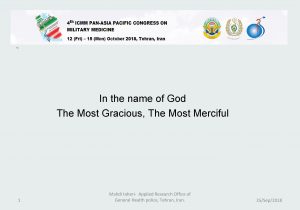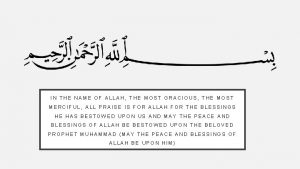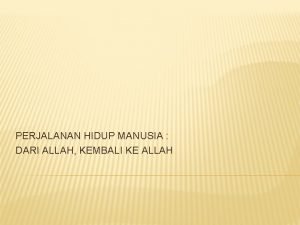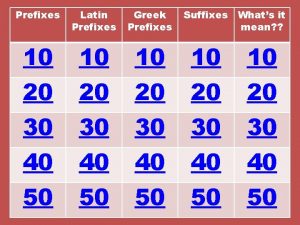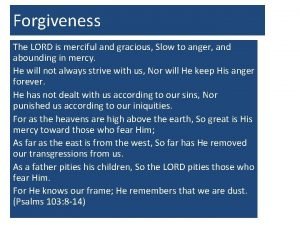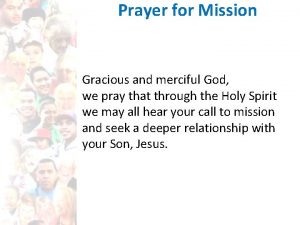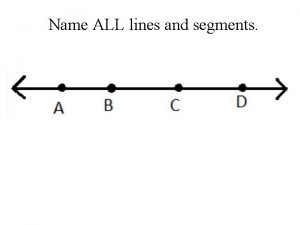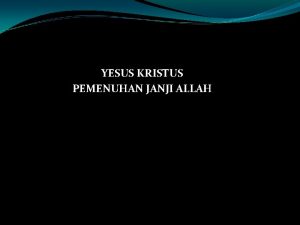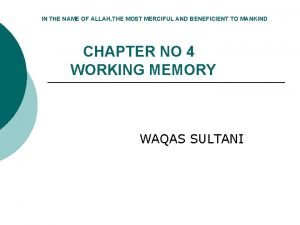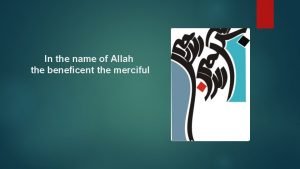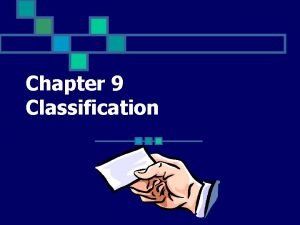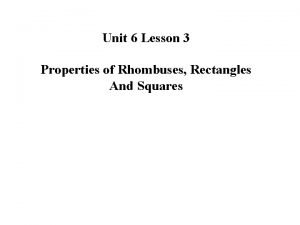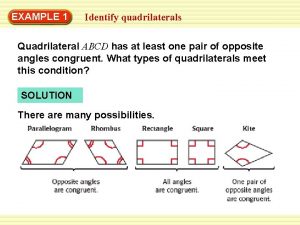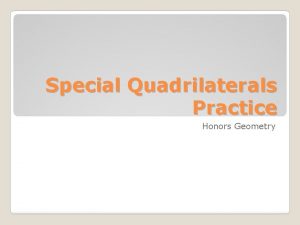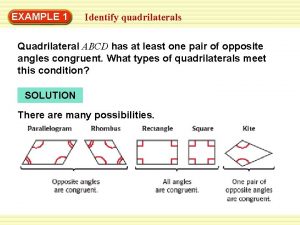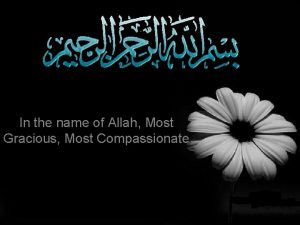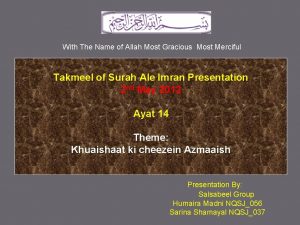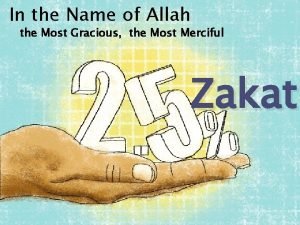In the Name of Allah the Most Gracious





















































- Slides: 53

In the Name of Allah, the Most Gracious, the Most Merciful


Month of the Mercy

• • • • Outline Definition of Fasting Obligation of Fasting in the Quran & Sunnah When does Ramadan Start? The Pillars of fasting The Sunnah of fasting The Conditions that Require Fasting People Exempted From Fasting in Ramadan • Sick Person • Traveler • Women (Menstruation, Breast-Feeding etc. ) Matters that Nullify the Fast Expiation & Make up of fasting Things that don’t Nullify Fasting Rulings on Women Fasting I’tikaf Lailatul Qadr Zakatul Fitr

1) Definition of Fasting 1) Linguistically: Fasting means to Abstain from (to refrain from) • Allah says in surah Maryam, verse 26, abstaining from speaking, ﻱ ﻟ ﺍ ﺍﻧﺍ Ø Indeed, I have vowed to the most Gracious a FAST, so I will not speak today to any human being. 2) Legally: Fasting means abstaining from a) food b) drink and c) marital relations from d) 1) the true Fajr (Subh Sadiq) until 2) sunset, with a specific 3) intention 3) It is followed by abstinence from foolish talk (backbiting, lying, betraying, name-calling etc. ), and other forms of prohibited speech. 4) Act of worship Fulfilling Allah’s Rights ( ) and Human Rights ﺍﻟﻠہ ﺣﻘﻮﻕ simultaneously.

When to Stop Eating? • The beginning time for the Fajr prayer is the start of the time for fasting according to all Muslim scholars. • The basis of this consensus is the verse, ﻭ ﺍﻭ ﻯ ﺍ ﺍﻷ ﺍ And eat and drink until becomes distinct to you the white thread from the black thread……. [Baqarah 187]. • In this verse, Allah has referred to the darkness of night as the black thread ( )ﺍﻟﺨیﻂ ﺍﻷﺴﻮﺩ and the light of dawn as the white thread. ( )ﺍﻟﺨیﻂ ﺍﻷﺒیﺾ • Adi bin Hatim related: When this verse of the Holy Qur’an was revealed, then I placed two threads (a black and a white one) under my pillow and kept observing them throughout the night. • I was unable to distinguish a clear distinction between the two. In the morning, I went to the Prophet and related my experience to him. Ø The Prophet stated that the white and black thread refers to the commencement of the day and the darkness of the night. [Bukhari].

When to Stop Eating? • The beginning time for the Fajr prayer is the start of the time for fasting according to all Muslim scholars. • The basis of this consensus is the verse, ﻭ ﺍﻭ ﻯ ﺍ ﺍﻷ ﺍ And eat and drink until becomes distinct to you the white thread from the black thread……. [Baqarah 187]. • The Prophet (saw) instructed the Companions, Ø The athān (call to prayer) of Bilāl should not prevent you from eating Sahūr (predawn meal) because he gives athān at night, therefore keep eating and drinking until you hear the athān of ʿAbdullāh b. Umm Makktum. He (ʿAbdullāh b. Umm Makktum) gives athān when the Fajr comes out. • The commencement of the fast occurs from Subh Sadiq, if a person eats after this time, his fast is not valid. • Eating after this time causes the fast to break even if a person was to eat for an extra minute.

2 a) Proofs for the Obligation of Fasting-Al. Quran 1) Allah says in Surah Baqarah, verse 183, ﺍ ﺍ ﺍﻳ آﻭ ﺍﻟ ﺍ ﺍ ﻯ ﺍﻳ ﻥ ﻭ Ø O you who have believed, decreed upon you is fasting as it was decreed upon those before you that you may become righteous. 2) Allah says in Surah Baqarah, verse 185, ﻥ ﻧ ﺍﻟ So whoever among you witnesses the month (of Ramadan), he must fast in it • The main Objective of Fasting Taqwa Fear of Allah • Definition of TAQWA It was reported that `Umar bin Al-Khattab asked Ubayy bin Ka`b about Taqwa. Ø Ubayy said, O Leader of the believers, what do you do when you have to pass through a thorny road? Umar (RA) replied, “I lift my cloth up to my calves and watch my footsteps and take each step slowly from the fear of thorns lest they don’t prick me”. . '' Ubayy said, "That is Taqwa. ''

Contd. 2 b) Proof From the Sunnah • Ibn Umar (may Allah be pleased with him) reported: • The Prophet Muhammad said: ﺍﺍ ﻯ ﻯ ﺍﻟ ﺍ ﻭ ﺍ ﺍﻟ ﺍ ﻳﺍ ﺍﻟ ﺍ ﺍ ﺍ • Islam is built upon five: 1) to worship Allah and to disbelieve in what is worshiped besides him, 2) to establish prayer, 3) to give charity, 4) to perform Hajj pilgrimage to the House, 5) and to fast the month of Ramadan. • Reported by Bukhari

3) The Conditions that Require Fasting • The fasting being an obligation upon the Muslim (both Men & Women) is that [ O you who have believed, decreed upon you is fasting ﺍ ﺍ ﺍﻳ آﻭ ﺍﻟ ﺍ ] a) b) c) The person is of sound mind (Aqil) and A person has reached the age of puberty (Baligh). A woman is pure (from menstrual/postnatal bleeding). • This is due to the Prophet’s statement: Ø The pen is lifted from three (persons): • the insane person until he regains his intellect • the sleeping person until he awakens and • the child until he reaches the age of puberty. (Ahmad and Abu Dawud, and it is Sahih). • In another Hadith, the Prophet (saw) said, Ø Is it not that when she menstruates, she does not pray and she does not fast? (Al-Bukhari)

4) When does Ramadan Start? • There are three ways from which we can know when does the month of Ramadan start: 1) That we know that we’ve completed the thirty days of the month of Sha’ban. (A Lunar month is Either 29 or 30 Days). 2) When we sight the moon on the 29 th of Sha’ban. ﻥ ﻧ ﺍﻟ Ø So whoever among you witnesses the month (of Ramadan), he must fast in it …… 3) When the night of 29 th Sha’ban is cloudy, we will assume that Sha’ban will last for thirty days. It is mentioned in the hadith: ØWhen you see the crescent moon (of Ramadan) then fast and when you see the crescent moon (for Shawwal) then stop fasting. And if it (moon) is hidden from you by clouds, then complete it out (the thirty days of Sha’ban).

5) The Pillars of Fasting Intention 1) Intention • • Ø Ø Ø • • The intention must be made before Fajr and during every night of Ramadan This is due to the statement of the Prophet. Deeds/actions are judged according to the intentions. ” (Al-Bukhari). Whoever does not plan (intend) to fast before Fajr, will have no fast. ” (Ahmad, At-Tirmidhi, Abu Dawud, Ibn Majah). If it is a non-obligatory (voluntary) fast, the intention maybe made at any time before any food is consumed. This opinion is based on to the statement of Aishah. She said, Ø The Messenger of Allah (saw) entered one day and ask me, Do you have anything (to eat)? We said, “No”, He (saw) said: Then verily I am fasting. ” (Muslim, Abu Dawud) 1) The Prophet didn’t make an intention before the true Dawn. 2) He didn’t eat anything So he continued fasting.

Contd. 5) The Pillars of Fasting 2) Refraining (Abstaining) 3) Definition of Fasting means abstaining from a) b) c) d) food drink and marital relations from the true Fajr (Subh Sadiq) until sunset. Subh Sadiq Breaking Period Sun Fasting Set Period 3) Az-Zaman (The Time) • This mean the daytime, which is from the entry of Fajr (the first crack of dawn on the horizon) until the setting of the sun. • So if a man fasted during the night and did not fast during the day, his fast will never be correct (i. e. acceptable). • This is due to the statement of Allah (swt): ﻭ ﺍﻟ ﺍ ﻯ ﺍﻟ Then complete the fast until the night…

6) The Sunnah of Fasting (Recommended Acts) 1) As-Sahur (Pre-Dawn Breakfast) • This is eating and drinking during the last part of the night before Subh Sadiq with the intention of fasting. • Time of Sahur The time of Sahur begins from the last half of the night and it ends (a few) minutes before Fajr comes in. • This is due to the Prophet’s statement: Ø Verily that which separates (i. e. distinguishes) between our fast and the fasting of the People of the Book (i. e. Jews and Christians) is the eating before dawn (Sahur). ” (Muslim) • In another hadith, the Prophet (saw) said: Ø Eat the meal of Sahur for verily in the Sahur there are blessings. ” (Al- Bukhari and Muslim)

Contd. 6) The Sunnah of Fasting (Recommended Acts) 2) Delaying Sahur Until the Very Last Part of the Night • This is due to the Prophet’s statement: Ø My Ummah will not cease being upon goodness as long as they hasten in breaking the fast and delay the Sahur (predawn meal). ” (Ahmad and it is authentic) • Whoever has doubt about the entry of Fajr (the crack of dawn), he may eat or drink until he is certain that the time of Fajr has entered. This is due to Allah the Almighty’s statement: • ﻭ ﺍﻭ ﻯ ﺍ ﺍﻷ ﺍ Ø And eat and drink until becomes distinct to you the white thread from the black thread……. [Baqarah 187].

6) The Sunnah of Fasting (Recommended Contd. Acts) 3) Hastening the breaking of the fast: • This is breaking the fast (Al-Iftar) immediately after it is confirmed that the sun has set. • This is due to the Prophet’s statement, Ø The people will remain upon goodness as long as they hasten in breaking the fast. ” (Al-Bukhari and Muslim). • And the statement of Anas, who said: Ø Verily the Prophet did not used to pray Al-Maghrib (the prayer after sunset) until he (saw) broke his fast (first), even if it was with a drink of water. Ø (Tirmidhi, and he said it is Hasan).

6) The Sunnah of Fasting (Recommended Acts Contd. ) 4) Breaking the fast with fresh dates or dried dates or water • The best of these three things is • the first of them (fresh dates), • and the last of them (water) is the least preferred of them. • Anas bin Malik said: Ø The Messenger of Allah (saw) used to break his fast with fresh dates before praying (the Maghreb prayer). If there were no fresh dates, he would break his fast with dry dates. If there were no dry dates he would take some sips of water. (At. Tabarani). • It is also recommended to break the fast with an odd number – three, five, or seven (of whatever is being eaten).

Contd. 6) The Sunnah of Fasting (Recommended Acts ) 5) Supplicating when breaking the fast: 2) Ibn Umar said: The Messenger of Allah (saw) used to say when breaking his fast: ﺍﻷ ﺍ ﺍﻟ ، ﺍ ﺍﻭ ، ﺍ Ø The thirst has gone and the veins are quenched, and reward is confirmed, if Allah wills. [Abu Dawood]

7) Difference Between Make Up & Expiation (Kuffarah) • The breaking one's fast (obligatory) are of two kinds. 1) Make up (Qaza) UNINTENTIONAL BREAKING OF FAST (Due to a compulsion Menstruation, Traveling or sickness) • To observe one fast in place of the fast which is broken intentionally. (Because of a COMPULSION such as Menstruation, Traveling, Sickness etc. ) 2) Expiation ( ) ﻛﻔﺎﺭﺓ INTENTIONAL BREAKING OF FAST • Fasting means abstaining from • food, drink, and marital relations from the true Fajr (Subh Sadiq) until sunset (FASTING PERIOD). • If someone breaks one’s FAST by a) Eating or Drinking (Intentionally) or b) Having Marital Relation (Intentionally, During the Fasting period) • • EXPIATION To observe fasting CONTINUOUSLY for sixty days. And one day as qada.

1) 2) 3) 4) 7) Matters that Break the Fast and Require Makeup Anything put by force into the mouth of the fasting persons. A fluid substance reaching the inside of the body by means of a) the nose, like snuff, or b) by way of the eye or ear, like drops, or c) by way of an injection with a syringe. Whatever reaches the inside of the body due to exaggerating in rinsing the mouth and inhaling and exhaling waters from the nose during Wudhu’ and other than it. (That’s why SWIMMING is not allowed). Intentional vomiting. This is due to the Prophet’s statement: Ø Whoever makes himself vomit intentionally, must make up for the fast. (Abu Dawud and At-Tirmidhi) Unintentional vomiting Doesn’t harm/break fasting. Ø However, whoever is overcome by vomiting and he vomits without him choosing to do so, this does not harm his fast.

Contd. 7) Matters that Break the Fast and Require Makeup 5) Whoever eats or drinks while thinking that it is still nighttime, then it becomes evident to him that Fajr is in. (Delaying Suhur Too Much) 6) Whoever eats or drinks while thinking that nighttime (i. e. sunset) has come, then it becomes evident to him that it is still daytime. (Early Iftar while sun is not set) 7) Whoever eats or drinks out of forgetfulness and then he does not abstain (from eating and drinking thereafter), thinking that abstaining is not obligatory upon him as long as he ate and drank, and thus he continues eating and drinking (i. e. not fasting until night comes). 8) That which is not food or drink reaching the inside of the body by way of the mouth, like swallowing a gem or a string. This is due to what was narrated from Ibn ‘Abbas, that he said: Ø Fasting is for what enters (the body) and not for what comes out. ” (Ibn abi Shaibah) • He (Ibn ‘Abbas) meant by this that the fast is harmed by what enters the body and not by what comes of it, such as blood and vomit.

Contd. 7) Matters that Break the Fast and Require Makeup 9) Rejecting (breaking) the intentions to fast, even if the person does not eat or drink, as long as he is not thinking that it is the time for breaking the fast, otherwise his fast is nullified. 10) Swallowing intentionally a pebble, piece of paper or any item that is not used as food or medicine. 11) Swallowing something edible, equal to or bigger than a grain of gram which was stuck between the teeth. However if it is first taken out of the mouth and swallowed, it will break the fast whether it is smaller or bigger than the size of a gram. 12) Putting oil into the ear. (Specially if someone has perforated membranes). 13) Inhaling and snuff into the nostrils.

Contd. 7) Fasting of Makeup (Qada) • Whoever has missed a fast of Ramadan (Unintentional because of a legitimate reason) is liable to compensate it with fasting after Ramadan. • Fast of qada’ should be observed as soon as possible after one has missed a fast of Ramadan. • Fast of qada may be observed any day during the year except for the following days: a) First of Shawwal (Eidul-fitr). b) Tenth (10 th) of Zulhijjah (Eidul-adha). c) Eleventh (11 th), twelfth (12 th) and thirteenth (13 th) of Zulhijjah. • On these days fasting is strictly prohibited, so the fast of Qada’ cannot be observed, on these days. • Delaying the performance of qada’ without a valid reason is not desirable.

8) Matters that Break the Fast and Require Expiation • Expiation Which atones for a sin from opposing the Islamic Law. • Fasting means abstaining from • food, drink, and marital relations from the true Fajr (Subh Sadiq) until sunset (FASTING PERIOD). • Expiation is only required for two (specific) things that nullify the fast. 1) Eating or Drinking Without a Valid Excuse (Intentionally) • In a hadith, Abu Hurairah (RA) said, • A man came to the Prophet and said, ‘I intentionally broke my fast one day during Ramadhan. ’ The Prophet (saw) said: a) Free a slave or b) fast two consecutive months (60 -Days continuous fast) or c) feed sixty poor people. ” • [Recorded by Al-Bukhari and Muslim].

Contd. 8) Matters that Break the Fast and Require Expiation 2) Intentionally having marital relations under no compulsion: • This is due to the statement of Abu Hurayrah, : Ø A man came to the Prophet(saw) and said, O Messenger of Allah(saw), I have destroyed myself. ’ So the Prophet(saw) said, ‘What have you done? ’ ‘The man said I had marital relations with my wife when I was fasting’. • So the Prophet(saw) asked him, a) Do you have a slave that you can free? ’ He said, ‘No. ’ b) Then he(saw) said, ‘Can you fast two months? ’ The man replied, ‘No. ’ c) So then the Prophet(saw) said, ‘do you have enough so you can feed sixty poor people? ’ The man again said, ‘Wallahi last night we went to sleep we couldn’t even eat our food. ’ • Then Prophet(saw) was quiet and some sadaqah was brought to him. • Take this and give it away as charity”. • The man said, ‘Shall I give it to someone poorer than us, for I swear by Allah, there is not a family between its (Al-Madinah’s) two mountains more in need of it than us? ’ So the Prophet said, Go and feed your family with it. ” (Bukhari -Muslim)

Contd. 8) The Expiation ( )ﻛﻔﺎﺭﺓ of the Obligatory Fasting • Expiation which atones for a sin resulting from opposing Islamic Law. 1) Intentionally having marital relations under no compulsion 2) Eating or drinking without a valid excuse • The Expiation is to FAST • Sixty Days Continuously without any interruption • If interrupted, one has to restart the 60 days period. • Exception for not Continuous Fasting for Women • Menstruation or Post natal bleeding • Once her menstruation stops, she must continue to fast after she becomes pure. • If she delays fasting after becoming pure, she has to restart 60 days of fasting. • The same is true for a woman in the state of post-natal bleeding.

Contd. 8) The Expiation ( )ﻛﻔﺎﺭﺓ of the Obligatory Fasting • The Expiation is to FAST • Sixty Days Continuously without any interruption • If interrupted, one has to restart the 60 days period. • If someone is genuinely unable to perform 60 days fasting continuously, then one must either a) Feed sixty poor people to their fill (satisfaction) for two meals or b) Feed one poor person to his fill for two meals a day for 60 days or c) Give sixty poor people 3. 5 lbs. wheat (1. 6 kg) or similar food grains or its monetary value or d) Give one poor person 3. 5 lbs. Wheat, rice or food grains or its monetary value for Sixty days. • These rulings are based on a Hadith of the Prophet (saw).

9) Things That Don’t Break the Fast • Certain matters are excused concerning the fasting person. They are as follows: 1) Swallowing saliva, even if it is a lot. What is meant here is the person’s own saliva and not the saliva of someone else. 2) Unintentional vomiting and that which comes up with belching if nothing of it returns to the person’s stomach after it reached the edge of his tongue. 3) Swallowing a fly unintentionally and not by choice. 4) Swallowing dust from the road and factories, smoke from firewood, which are not possible to avoid. 5) Wet dreams. There is no sin upon the person who has a wet dream while he is fasting. However, one has to get a bath ASAP • This is based on the Hadith: Ø The pen is lifted from three (people): • the insane person until he regains his intellect, • the sleeping person until he awakens and

Contd. 9) Things That Don’t Break the Fast 6) Taking a bath to keep one’s body cool. 7) Applying perfume. Not permitted inhaling incense smoke. 8) Eating or drinking unintentionally or forgetfully, (EXCEPT that Imam Malik held the view that the person must make up for the day if it was obligatory fast. • This was out of precaution on his behalf). • However, concerning the non-obligatory fast, one is definitely not obligated to make it up. 8) This is due to the Prophet’s statement: Ø Whoever forgets while he is fasting and he eats or drinks, then let him complete his fast. For it was only Allah who fed him and gave him drink. ” [Al-Bukhari and Muslim]. Ø Whoever breaks his fast during Ramadan due to forgetfulness, then he does not have to make up for that day, nor make an expiation. ” [Ad-Daraqutni and it is Sahih].

Contd. 9) Things that Don’t Break Fast 9) All kinds of preparations that are put on the outside of the body, whether they are for treatment, moisturizing, beautification or any other purpose, do not break the fast unless they are swallowed by the fasting person. 10) Applying Kohl (eyeliner, surma) or similar things, which enter the eyes for beauty or medicinal purposes do not nullify the fast. 11) Eye, Ear or Nose Drops, Nasal Sprays, Wearing Perfumes, Oiling one's Hair do not break the fast, so long as one avoids swallowing any material that may reach the throat. (because they are neither food nor its substitute). 12) Taking Injections, which do not provide nourishment and are meant for medical treatment only, such as penicillin, insulin, or injections for the purpose of vaccinations, do not affect the fast at all. 13) The injections with nutritional values such as glucose or vitamins, etc. are considered as food and therefore, nullify the fast. 14) Bloodletting for Medical Purposes; If the amount of blood is small and it does not harm the person, then it does not invalidate his fast, such as the small amount of blood that is taken for blood-testing.

10) Things that are undesirable (makruh) 1) Exaggerating in gargling and inhaling water into the nostrils during ablution (Wudhu’). This is due to the Prophet’s statement: Ø And exaggerate when inhaling and exhaling waters from the nostril, unless you are fasting. Ø [Abu Dawud, At-Tirmidhi, An-Nasa’I, Ibn Majah]. 2) Lustfully staring at the spouses. 3) Thinking about having Marital Relations (imagining it) while fasting. 4) Touching the woman with the hand with sexual desire. 6) Rinsing the mouth in other than Wudhu’ or without a need to do so. (To gargle more than necessary) so. ( 7) Applying kohl (to the eyes) at the beginning of the day, but there is no problem with doing so at the end of the day.

Contd. 10) Things that are undesirable (makruh) 8) To chew rubber, gum, plastic items or other such things. 9) To taste any article of food or drink and spit it out. If a woman has a very ill-tempered husband, it is permissible for her to taste the food provided it does NOT go down the throat. 10) To collect one's saliva in the mouth and then to swallow it trying to quench thirst. 11) To delay a bath that has become obligatory (wet dream, or marital relations) knowingly until after Subha Sadiq. 12) To use paste or tooth powder to clean one's teeth. It is permitted to clean with a miswaak of any fresh branch or (tooth stick). 13) To complain of hunger and thirst. 14) To quarrel, argue, use filthy or indecent words. 15) To backbite, tell a lie and swear etc. are sinful acts even when one is not fasting. Therefore they become even worse when fasting.

11) People Exempted From Fasting in Ramadan ﺍ ﻯ ﺍﻳ ﻳﻭ ﺍ ﻳ ﻥ ﺍ [Surah Baqarah: 184] ﻥ ﺍ ﻧﻡ ﻳﺍ ﻯ but if any of you is ill or on a journey, the same number (should be made up) from other days. And as for those who can fast with difficulty, (e. g. an old man, etc. ), they have (a choice either to fast or) to feed a Miskin (poor person) (for every day). • Those who have excuse from fasting in Ramadan 1) Children under the age of Puberty. 2) The insane people. 3) Temporarily Sick Person whose health is likely to be severely affected by Temporarily Sick Person fasting. Allowed to break their fast Requires makeup for the missed days 4) Traveler (may break the fast during their travel make up for missed days) Traveler ( 5) Menstruating Women and Women in Post-Child birth bleeding (Makeup) 6) The pregnant and breast feeding woman (may break their fast Makeup is required for missed days. • Those who have Permanent excuse from fasting in Ramadan 1) The old 2) The fragile 3) The Terminally sick person

Contd. 11) Exemption from Fasting - 1) The Sick 1) If the Muslim becomes ill during Ramadhan he can fast without difficulty, then he should fast. 2) If he is not able (to fast without difficulty), he breaks his fast. • Two Options Then if he expects to recuperate from his illness, then he makes up for whatever days he did not fast. • However, if he is not expected to recover, he breaks his fast and gives charity for each day that he does not fast. • The FIDYA is the last option. • This is due to Allah’s statement. ﻯ ﺍﻳ ﻳﻭ ﺍ ﻳ Ø And as for those who can fast with difficulty, they have to feed a poor person as compensation. [2: 184].

Contd. 11) Exemption From Fasting 2) The Traveler • For a Muslim traveler a distance more than 48 -miles (77 km) • Stay does NOT intend staying more than 14 days at his destination. • According to Shafi, i madhab Distance 50 miles (80. 5 km) • Stay four days or less. • Summary For a traveler, the Shari’ah has allowed him to break his fast. • But the Traveler has to make up the fast that he broke when he returns to his homeland. • This is due to Allah’s statement: ﺍ ﻥ ﺍ ﻧﻡ ﻳﺍ ﻯ Ø So Whoever was ill among you or on a journey, then (he must make up) the number (of days) from other days. (2: 184) • If fasting during travel is not difficult for him, then he should fast and that would be better.

Contd. 11) Rulings for Travelers • Observing the permission to break the fast while traveling is better. 1) Allah's Messenger said about fasting while traveling: ﻩ ﺍ ﺍ ﺍ ، Ø Those who did not fast have done good, and there is no harm for those who fasted. 2) In another Hadith, the Prophet said: ﻡ ﺍﻱ ﺍﻟﻠ Ø Hold to Allah's permission that He has granted you. 3) A'ishah narrated that Hamzah bin `Amr Al-Aslami said, Ø O Messenger of Allah! I fast a lot, should I fast while traveling? • The Prophet said: ﺭ ، Ø Fast if you wish or do not fast if you wish.

Contd. 11) Exemption From Fasting- 3) The Elderly Person • If the Muslim man or woman reaches the extreme old age, do not have the strength to fast, they may break the fast and give charity for everyday that they did not fast. • Allah says in Surah Baqarah, verse 184, ﻯ ﺍﻳ ﻳﻭ ﺍ ﻳ Ø And as for those who can fast with difficulty, (e. g. , an old man), they have (a choice either to fast or) to feed a Miskin (poor person) (for every day). "It means `those who find it difficult (to fast). ' • This is due to the statement of Ibn Abbas: Ø It was permitted for the very elderly man (or woman) to feed a poor person for every day (that he did not fast), and he did not have to make up for the days. Ø (Ad-Daraqutni and Al-Hakim, who graded in Sahih. )

Contd. 11) Exemption From Fasting- 4) The Pregnant Women • If the Muslim woman is pregnant and she fears for herself or the child she is carrying, she may break her fast. • Later, she has to make up for missed days of fasting. • Breast-Feeding Women • If the Muslim woman is breast-feeding and if she fears for herself or for her child and she cannot find anyone to breast feed the child (for her), or if the child will not breast-feed from anyone other than her. • In that case she may break the fast. • Later, she has to make up for missed days of fasting.

Contd. 11) Exemption From Fasting- 4) Breast-Feeding Women • Breast-Feeding Women • This ruling is derived from the statement of Allah: ﻯ ﺍﻳ ﻳﻭ ﺍ ﻳ Ø And as for those who can fast with difficulty, they have to feed a poor person as compensation. (2: 184). • Later, she has to make up for missed days of fasting. • Anas narrated that the Messenger of Allah said: • “Allah, has relieved the traveler of fasting and of half of the prayer (i. e. he can shorten it) and the pregnant and the breastfeeding woman from fasting. ” [Abu Daawood, At-Tirmithi , Ibn Maajah]. • SUMMARY So those who break their fast, they have to EITHER 1) make up for the missed days of Fastings or 2) feed poor person (for each missed day of Fasting).

Contd. 11) Fidya (Compensation) ﻯ ﺍﻳ ﻳﻭ ﺍ ﻳ ØAnd as for those who can fast with difficulty, they have to feed a poor person as compensation. (2: 184). 1) A very old person who does NOT have the strength to fast or 2) A very sickly or diseased person who has NO hope of recovering after Ramadan should give FIDYA for each fast he missed in Ramadan. • The Fidya (compensation) for a broken fast is a) To give 3 1/2 Ibs = approx. 1. 6 kg of wheat b) OR 7 lbs = approx. 3. 2 kg of barley c) OR the equivalent of the above in cash or kind. • • • If, however, an old or sick person gains strength or recovers after Ramadan, he must observe the missed number of fasts. Whatever was given as Fidya will be a reward for him from Allah. No one is allowed to fast for another (sick or fit ) person.

12) What does Women do if her Periods Start in Ramadan? • If menstruation starts in Ramadan during the night • Any time from Maghrib before the entering of Fajr (Subh Sadiq). • She refrains from Fasting the following day and the for the duration of her menstruation. Subh Sadiq Night Time Breaking Period Sun Set Fasting Period Day Time • If her menstruation starts in Ramadan during the day time, Ø Any time from entering of Fajr to the entering of Maghreb. Ø Her fast is nullified and it does not count Ø She has to make up this day after Ramadan Ø She must refrain from fasting for the duration of her menstruation. • A menstruating woman should record the number of days she missed in Ramadan and she should make up those missed days after Ramadan. • The same rulings apply to a woman in a state of post-natal bleeding

Contd. 12) What does Women do if her Periods Start in Ramadan? • If her menstruation stops in Ramadan during the night • Any time from Maghreb before the entering of Fajr • She should become pure by taking a bath and she should Fast the following day and the remainder of Ramadan. Subh Sadiq Night Time Breaking Period Sun Set Fasting Period Day Time • If her menstruation stops in Ramadan during the day 1) Any time from entering of Fajr to the entering of Maghrib, 2) She should perform a purification bath 3) She should act like a fasting person because of the sacredness of Ramadan 4) She should refrain from eating/drinking for the remainder of the day. 5) This day; however, does not count and she must make up for this day. 6) Istihaadah (non-menstrual bleeding) does not have any effect on the validity of the fast. • The same rulings apply to a woman in a state of post-natal bleeding.

13) Taraweeh: • Taraaweeh from a word Tarweehah which means a BREAK • During Salaat-ut Taraweeh prayer, the worshippers take a break after each four Rak’ah. • The Salaat-ut-Taraaweeh represents Qiyaam-ul-Layl in Ramadan. • Its Manner: Taraweeh is offered in 2 rakahs praying with Imam until the imam finishes. • Its number: (8 taraweeh + 3 Witr = 11) or (20 Taraweeh + 3 Witr = 23). • The Prophet said: Ø Whoever performed the night prayer in Ramadhan with sincere faith and hoping for a reward from Allah, then all his past sins will be forgiven. [Al-Bukhari] • Tahajjud For Tahujjud, you have to wake up after sleeping. • So tahajjud means getting up to pray at night. Sunnah 8 + 3 Witr

Contd. 13) Taraweeh: • Taraaweeh it is a Plural of Tarweehah which means a BREAK • The time of Taraweeh It begins after the performance of the obligatory (Fardh) prayer of ‘Isha. • Therefore, the one who has not performed the Fard prayer of Isha cannot join the prayer of Taraweeh. • He should perform the Fard of ‘Isha first, then join the Tarawih. • Some scholars say Imam is intending for the Taraweeh if you have missed Isha Obligatory prayer You should not perform it with congregational taraweeh prayer. • REASON Imam intention is For Taraweeh • You are INTENDING for Isha Obligatory (Fardh) prayer Conflict of intention between Imam & you (Maqtadi).

14) Itikaf • Itikaf means, • It is going into seclusion in the mosque for the sole purpose of worshipping Allah. • The masjid must be the one where prayer with congregation is offered. • Ummul Momineen, Aisha said, • The Prophet would always perform Itikaf in the last ten days of Ramadan until Allah took his soul. [Bukhari] • Some Scholar have said, • It is strange how the people have left performing the Itikaf. The Prophet performed some acts and left them, but he never left Itikaf from the time he entered Medina to the moment he died.

Contd. 14) Rulings Concerning Itikaf 1) The scholars said that one of the greatest aims of I’tikaf is to seek Laylat al-Qadr. 2) Starting Time of Itikaf A man should enter the mosque before the sun sets on the night of the twenty-first (21 st night). 3) Ending Time of Itikaf He should come out after the sun sets on the night of Eid, whether the month is twenty-nine days or thirty • Certain conditions for the person in I’tikaf • ‘Aa’ishah said: • The Sunnah for the mu’takif is a) not to visit any sick person, b) or attend any funeral, c) or touch or be intimate with any woman, d) or go out for any reason except those which cannot be avoided (toilet, taking a bath). [Abu Dawud].

Contd. 14) Rulings Concerning Itikaf • LEAVING THE MUSJID without a valid Shar'ee reason will nullify the I'tikaaf. . a) b) c) d) e) to answer the call of nature to make obligatory bath (in the state of impurity). to bring food where no other person is available to bring it. to offer the Friday prayer, if no Friday prayer is offered the mosque for i’tikâf. To move to another mosque in the event of a serious danger to one’s life. • Difference of Opinion Among Scholar Regarding the Place of I’tikaaf 1) According to a group of scholars: • A woman can perform Itikaf in her home in her prayer area. 2) According to the Second Group of Scholars: • • • I’tikaf of a man or of a woman is not valid anywhere except in the mosque It is not valid in the prayer-place of a woman’s house or the prayer-place of a man’s house, which is a separate area set aside for prayer. [Al-Nawawi ]. The scholars take this verse as a reference [2: 187]. The scholars take this verse as a reference [ ﻧ ﺍﻭ ﻱ ﺍﺍ while you are secluded in the masajid (sholars include both Men/Women).

15) The Night of Power (Laylatul Qadr) ﺍ The Night of Qadr is better than a thousand months (1000 months or 83. 4 years).

Contd. 15) When is the Night of Qadr (Laylatul Qadr) • Aisha’a related that the Prophet ﺻﻠﻰ ﺍﻟﻠﻪ ﻋﻠﻴﻪ ﻭﺳﻠﻢ said: Ø Seek out Lailatul-Qadr in the (odd nights) of the last ten days of Ramadhan. (Bukhari, Muslim) 2. Ubaadah bin Saamit (ra) reports that he asked the Prophet ﺍﻟﻠﻪ Ubaadah bin Saamit (ra) reports that he asked the Prophet ﺻﻠﻰ ﻋﻠﻴﻪ ﻭﺳﻠﻢ about “Laylatul Qadr. • He ﺻﻠﻰ ﺍﻟﻠﻪ ﻋﻠﻴﻪ ﻭﺳﻠﻢ replied: It is in Ramadhan, during the last ten days, on the unevenly numbered nights, • Either the 21 st, • Or the 23 rd, • Or the 25 th, • Or the 27 th, • Or the 29 th or • the last night of Ramadan. • Abu Hurairah narrated that The Prophet ﺻﻠﻰ ﺍﻟﻠﻪ ﻋﻠﻴﻪ ﻭﺳﻠﻢ said: • Whoever prays during the night of Qadr with faith and hoping for its reward will have all of his previous sins forgiven. [Bukhari/ Muslim].

Contd. • • 15) Signs of the Night of Qadr (Laylatul Qadr) From Ubayy, who said: that Allah's Messenger (saw) said: Ø On the morning following Laylatul-Qadr the sun rises not having any rays, as if it were a brass dish, until it rises up. [Muslim]. Ibn 'Abbaas (RA), said: Allaah's Messenger, (saw), said: • Lailatul-Qadr is quite, calm and pleasant, neither hot nor cold, the sun arises on its morning being feeble and red. a) it is a serene, quiet, shining night, b) Rain may fall either during the night or during the day of that night. c) During night the sky will be lightly foggy. d) no meteors are shot at the “Shayateen” on that night; e) it lasts until the break of the dawn. 3) Another sign is that at morning • the Sun rises without any radiant beams of light, appearing rather like the moon in its fullness. • On that day, Allah prohibits the “Shayateen” from rising up with the Sun. ”

16) Supplication on the Night of Qadr • Aisha (Ra) said: • I asked the Messenger of Allah: 'O Messenger of Allah, if I know what night is the night of Qadr, what should I say during it? • He (saw) said: Say: Ø O Allah, You are forgiving and You love to forgive, so forgive me. (Ahmad, Ibn Majah, and Tirmidhi).

17) Sadaqat-ul-Fitr 1) Ibn ‘Umar said: Ø That the Messenger of Allah ﺻﻠﻰ ﺍﻟﻠﻪ ﻋﻠﻴﻪ ﻭﺳﻠﻢ ordered that the Sadaqat-ul. Fitr should be paid before the people go out for prayer. • [Muslim, Abu Daawood, At-Tirmidhi, Ahmad]. 2) Ibn ‘Abbaas (ra) said: Ø It is from the Sunnah that Sadaqat-ul-Fitr is given before the Salaah-ul-Eid. • [Ibn Abi Shaibah and Ad-Daaraqutni]. 3) Naafi’ reported from Ibn ‘Umar (ra) that he said: Ø That the Messenger of Allah ﻭﺳﻠﻢ ﻋﻠﻴﻪ ﺍﻟﻠﻪ ﺻﻠﻰ ordered the giving of Zakaatul-Fitr should be performed before the going out (to the Masjid) of the people and that ‘Abdullah ibn Umar used to give it before that by a day or two. ” 4. Ibn ‘Abbaas (ra) said: Ø The Messenger of Allah ﻭﺳﻠﻢ ﻋﻠﻴﻪ ﺍﻟﻠﻪ ﺻﻠﻰ obliged (farada) Zakaat-ul-Fitr as a purification for the fasting person from false and vile speech and also as feeding for the poor (Masaakeen). Whoever performs it before the Salaah then it is acceptable Zakaah and whoever gives it after the Salaah then it is a Sadaqah from amongst the Sadaqaat. ”

 In the name of allah, the most gracious, the most merciful
In the name of allah, the most gracious, the most merciful Allah the most gracious
Allah the most gracious In the name of allah the beneficent the merciful
In the name of allah the beneficent the merciful Aqeedah meaning
Aqeedah meaning In the name of allah the most gracious
In the name of allah the most gracious In the name of god most gracious most merciful
In the name of god most gracious most merciful In the name of god most gracious most merciful
In the name of god most gracious most merciful In the name of god the most gracious the most merciful
In the name of god the most gracious the most merciful All praise due to allah the most gracious
All praise due to allah the most gracious In the name of allah the most beneficent the most merciful
In the name of allah the most beneficent the most merciful Beneficent pronunciation
Beneficent pronunciation In the name of allah the most beneficent the most merciful
In the name of allah the most beneficent the most merciful Allah the most beneficent
Allah the most beneficent Semua akan kembali kepadanya
Semua akan kembali kepadanya Bismillah images in english
Bismillah images in english Gracious professionalism examples
Gracious professionalism examples What does the suffix ious mean in the word gracious
What does the suffix ious mean in the word gracious The lord is merciful and gracious
The lord is merciful and gracious Oh good gracious
Oh good gracious Gracious and merciful god
Gracious and merciful god Gracious professionalism definition
Gracious professionalism definition Name all the lines name all the segments name all the rays
Name all the lines name all the segments name all the rays Pengertian asmaul husna secara istilah
Pengertian asmaul husna secara istilah Allah memenuhi janjinya karena allah tidak ingin manusia
Allah memenuhi janjinya karena allah tidak ingin manusia Allah the most
Allah the most Allah the almighty
Allah the almighty Allah the most
Allah the most Al qahhar meaning
Al qahhar meaning Bismillah slides for presentation
Bismillah slides for presentation In the name of allah the beneficent the merciful
In the name of allah the beneficent the merciful In the name of allah the compassionate the merciful
In the name of allah the compassionate the merciful Na oodhu billah
Na oodhu billah In the name of of allah the merciful
In the name of of allah the merciful In the name of allah the beneficent the merciful prayer
In the name of allah the beneficent the merciful prayer Presentation start with the name of allah
Presentation start with the name of allah In the name of of allah the merciful
In the name of of allah the merciful Most general to most specific classification
Most general to most specific classification Most general to most specific classification
Most general to most specific classification Name of organisms
Name of organisms Arrangement of organisms
Arrangement of organisms The diagonals of rectangle wxyz intersect at p
The diagonals of rectangle wxyz intersect at p Most specific name for quadrilateral
Most specific name for quadrilateral Identify
Identify Lord most high be magnified
Lord most high be magnified Name the two parts that make up most mirrors.
Name the two parts that make up most mirrors. Give the most descriptive name for each quadrilateral
Give the most descriptive name for each quadrilateral What is the most specific name for quadrilateral abcd?
What is the most specific name for quadrilateral abcd? Hát kết hợp bộ gõ cơ thể
Hát kết hợp bộ gõ cơ thể Ng-html
Ng-html Bổ thể
Bổ thể Tỉ lệ cơ thể trẻ em
Tỉ lệ cơ thể trẻ em Voi kéo gỗ như thế nào
Voi kéo gỗ như thế nào Thang điểm glasgow
Thang điểm glasgow Chúa yêu trần thế alleluia
Chúa yêu trần thế alleluia







